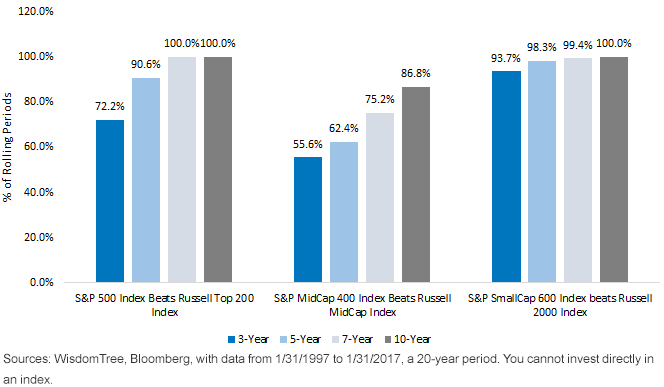WisdomTree has been innovating in the sphere of equity index development for more than 10 years, and along the journey we have learned many interesting things. One question that has come up through the results of our work is:
Why is the Russell 2000 Index so popular?
Russell Indexes vs. S&P Indexes
Over time, S&P indexes have tended to exhibit persistent outperformance of Russell indexes. We show, over a period looking back 20 years, the percentage of rolling 3-, 5-, 7- and 10-year periods where:
While one could never say that S&P would always outperform Russell, the consistent instances of outperformance across large-, mid-, and small-cap stocks are enough to motivate research into why there are differences in returns even among traditional “beta” approaches.
Outperformance of S&P over Russell Across Large Caps, Mid-Caps and Small Caps
Russell’s Methodology
The process begins with a very broadly inclusive approach defined by the Russell 3000E Index, which included 3,525 stocks as of December 31, 2016.1 The Russell Top 200 Index selects the largest 200 companies from this index. Ranked by market capitalization, the Russell Midcap Index is the 201st to 1,000th companies (therefore, 800 stocks). The Russell 2000 Index is the 1,001sts to 3,000th largest companies. Combined, the Russell Top 200 Index plus the Russell Midcap Index plus the Russell 2000 Index would equal the same constituents as the Russell 3000 Index.
Russell’s Bottom Line Focus: Broad inclusivity.
S&P Methodology: An important difference in S&P’s methodology for determining stocks eligible for the S&P 500 Index, the S&P MidCap 400 Index and the S&P SmallCap 600 Index is that “the sum of the most recent four consecutive quarters’ Generally Accepted Accounting Principles (GAAP) earnings (net income excluding discontinued operations) should be positive as should the most recent quarter.”2 Given that initial inclusion is in part determined by passing this measure, it tells us out of the gate that S&P tends to avoid more speculative companies.












Leave A Comment